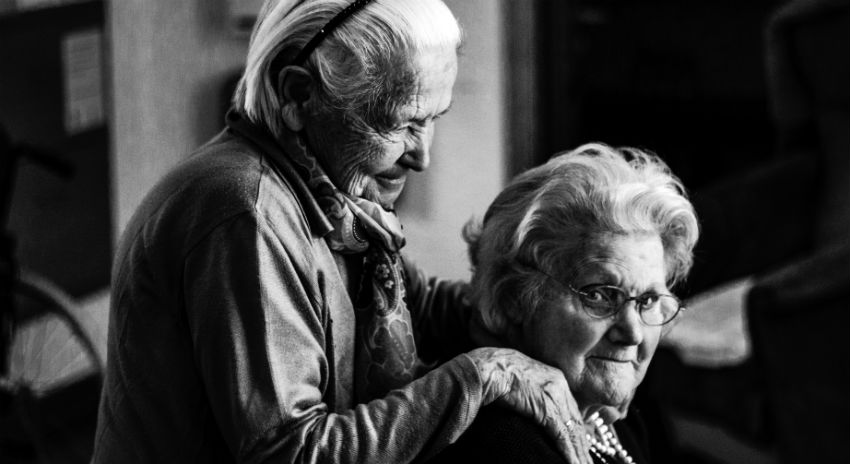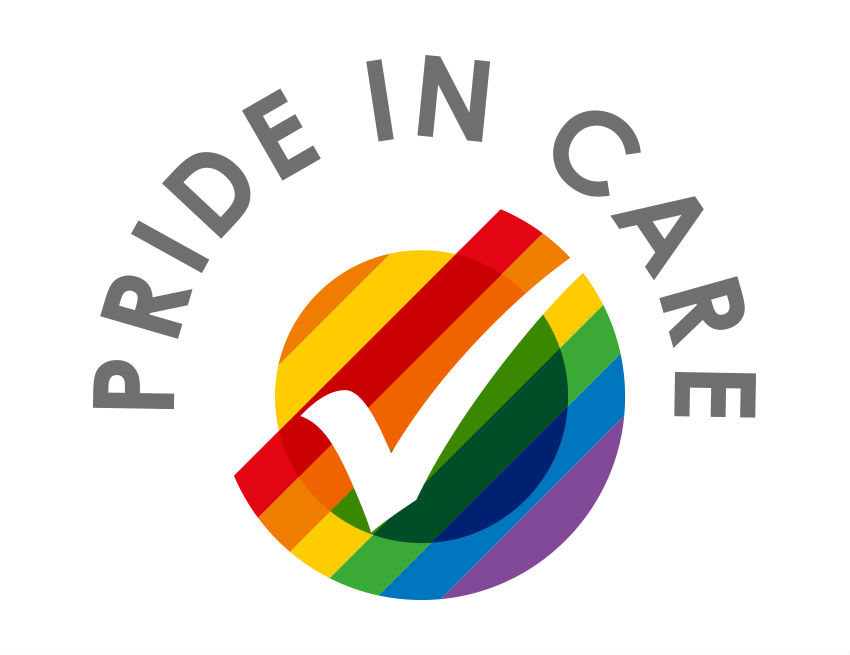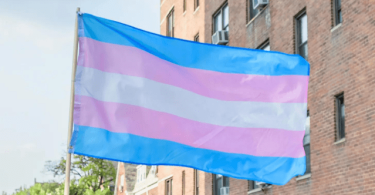Advances in healthcare mean many of us are living longer. The health and social care sector in the UK is a growing industry. However, austerity measures and cutbacks have raised questions about the quality of care across the sector.
Last year, the BBC revealed that 900 adult social care staff were quitting the industry every day. This shocking figure has led some service providers to warn the UK Government that vulnerable people are seeing a drop in the level of care they receive. Care agencies are increasingly reliant on people who will work for less pay.
LGBTI people have particular reason for concern. They are less likely to have children and may be estranged from their existing family. They are more likely to be reliant on good quality health and social care services than their heterosexual counterparts.
Trans people often feel particularly self-conscious about carers washing and dressing them.
Jo’s story
Jo Panter, 76, and lives in Hackney, London. A former theatre nurse, she is now wheelchair-bound and requires help from carers. She has been through 11 in the past 11 years.
Jo says she simply wants carers to turn up and do the jobs they’re supposed to do. However, she finds many ask intrusive questions about her life.
Jo is happy to describe herself as a butch lesbian. Throughout her life, she has often worn trousers, shirts and ties. This has led to some carers to question her wardrobe, or to ask if she has a man in the house.
‘I also have pictures around my house, and a big photo of Raquel Welch in One Million Years BC. One carer, she came here, and the first thing she did was go into my kitchen and make herself a cup of tea. She didn’t ask me if I wanted one. She made herself one and came through and sat with me to drink it, even though she only had half an hour to do all her duties.
‘Then she made comments and started asking about my life. I told her I was a lesbian. And she said she didn’t know what that was. I explained it was a woman who went with a woman, and she dropped her cup and broke it. She got very flustered!
‘One told me I should pray to be corrected. I should pray to the Lord. It was horrible.
‘I’ve got a very good carer now. She’s Muslim. She’s been with me for several years. I would phone up the agencies and complain, and they’d be apologetic, but they’d keep sending me these carers. I’d tell them, I just want them to do their job. I don’t want them questioning me about my life.’
Unhealthy attitudes
Opening Doors London is a groundbreaking charity set up to provide support for LGBTI people over the age of 50. It runs numerous social groups and befriending services – connecting isolated, older LGBT people with volunteer befrienders.
On 13 June it is hosting a conference in London for social health care professionals entitled Pride in Care. One of the highlights will be the launch of its new Pride in Care quality standard scheme. This is a quality standards badge care agencies can apply for to prove they take the care of their LGBT clients seriously.
Opening Doors says Jo’s experiences are not uncommon. A 2015 report by LGBT advocacy group, Stonewall, backs this up. Unhealthy Attitudes found ‘one in ten health and social care staff across Britain have witnessed colleagues express the dangerous belief that someone can be “cured” of being lesbian, gay or bisexual.’
The Pride in Care scheme is largely being overseen by Jim Glennon, the organization’s Training and Consultancy Manager.
Its quality standard badge will be aimed at care agencies, care homes and supported housing providers who can demonstrate standards specific to LGBT clients.
Glennon says Opening Doors London has heard of LGBT elders who have felt the need to go back into the closet in later life, wary of the response their sexuality my prompt among carers or other care home residents.
‘Often at their most fragile, possibly without much family support, they feel they cant express themselves as an LGBT person,’ says Glennon.
The new Pride in Care scheme comes from Opening Doors London
Taking Pride in Care
There will be a cost to applying for the badge, which will be on a sliding scale depending on the size of the organization.
After an initial conversation to explain how it works, the applicant’s management team will have a formal meeting with the Opening Doors team to discuss how they achieve the quality standard. Opening Doors will explore the company’s HR policies and complaints procedures, and then conduct a staff survey. This will examine the attitudes and views of staff on working with LGBT people.
If the survey results prompt any concerns, the organization will be advised to provide further LGBT-specific training for staff. Advice can also be provided on amending policies and procedure if they’re not up to scratch.
Depending on the size of the organization, site visits will be made. For example, a large organization with several care homes might expect three visits. People who identify as lesbian, gay and trans will act as ‘mystery shoppers’.
‘They will make a few phone calls, identify themselves, as lesbian for example, say they are interested in entering a care home, or speak on behalf of a family member or friend. They will check the website to see what it looks like, to see how inclusive the feel is around the site, and if there’s any issues with external communications.
‘Then, they will physically go into the organization, speak to people at reception, have a look around. There will be conversations with clients and service users.’

More of us are living for longer (Photo: Unsplash | CC0)
‘We will fail them if we really think there is a simple unwillingness to engage’
After a final report, the organization finds out whether they’ve achieved the Pride in Care standard.
‘Hopefully we’ll tell them they’ve passed for the standard with flying colors and can use our plaque and communication products. Or we’ll be saying “You need a bit more work.” On the rare occasion, we might have to say “You really need major organizational change on these issues because you’re not anywhere near the standards that enable us to say you provide good service for older LGBT people.”
‘Our aim is to get people through the standard,’ says Glennon. ‘Not to fail people. But we will fail them if we really think there is a simple unwillingness to engage with the materials.’
At the moment, the scheme will operate in London. It may extend outside the capital if it proves successful.
Jo Panter needs little convincing of the benefits of such a quality standard. Given her own experiences with carers in the past, she says knowing in advance if a care agency has attained it, ‘would be a blessing.’
See also
Are you scared of getting older and is the LGBTI world ageist?
These beautiful portraits of LGBTI elders with younger activists will inspire you







